商学部(塾外用) - 慶應義塾大学-塾生HP
商学部(塾外用) - 慶應義塾大学-塾生HP
商学部(塾外用) - 慶應義塾大学-塾生HP
You also want an ePaper? Increase the reach of your titles
YUMPU automatically turns print PDFs into web optimized ePapers that Google loves.
JAPANESE FOREIGN POLICY 2credits (Fall)<br />
日本の対外政策 2単位 (秋学期)<br />
Lecturer NOBORI, AMIKO<br />
講師 昇 亜美子<br />
Course Description:<br />
This course is a general introduction to postwar Japanese history with a<br />
focus on foreign policy; it also addresses important aspects of Japanese<br />
domestic politics as well as cultural issues. It will also examine<br />
international relations of the Asia-Pacific region while offering an<br />
overview of Japan’s evolving relations with a number of important actors<br />
in the region, such as the U.S., China and the ASEAN countries.<br />
Also throughout the course, contemporary issues within the post-Cold<br />
War global environment as well as controversial issues within Japan, such<br />
as constitutional revision and Yasukuni issue, will be discussed using a<br />
historical perspective.<br />
The class will combine lectures, academic readings, films, students’<br />
presentations and discussions in order to cover these areas noted above.<br />
JAPANESE ECONOMY 2credits (Fall)<br />
ジャパニーズ・エコノミー 2単位 (秋学期)<br />
Professor, Graduate School of Business and Commerce<br />
KASHIWAGI, SHIGEO<br />
商学研究科教授 柏木 茂雄 (フジタ・チェアシップ基金)<br />
Course Description:<br />
The objective of this course is to discuss and understand the<br />
developments in the Japanese economy and its policies from a global<br />
perspective.<br />
The course will provide opportunities for students, especially for those<br />
coming from abroad, to examine various policy issues that have arisen in<br />
Japan in the last three decades. This course will also provide opportunities<br />
for Japanese students to look at their own economy from a global<br />
perspective. The focus will be less on theoretical and empirical aspects<br />
and more on understanding economic, political, social as well as historical<br />
background of specific economic issues confronting the Japanese people<br />
in recent years.<br />
Textbooks:<br />
Cargill, Thomas F. and Takayuki Sakamoto, Japan Since 1980,<br />
(Cambridge University Press, New York, 2008)<br />
MANAGEMENT IN JAPAN 2credits (Spring)<br />
日本のビジネスマネジメント 2単位 (春学期)<br />
The Kaisha in the 21st Century<br />
Lecturer HAGHIRIAN, PARISSA<br />
講師 ハギリアン, パリッサ<br />
Course Description:<br />
The course introduces the characteristics of the Japan as a place of<br />
business and the main aspects of Japanese management. The course starts<br />
with a theory lecture on culture and its relevance for international<br />
management and business communication. After this an overview of the<br />
modern Japanese business environment is given. Major points of<br />
discussion are the most prominent aspects of Japanese management, such<br />
as production management, distribution as well as human resource and<br />
knowledge management within Japanese corporations.<br />
The course aims to:<br />
• provide an overview of the modern Japanese business environment<br />
• explain the most important social concepts in Japanese society and<br />
their relevance for Japanese management and Japanese business culture<br />
• discuss the most prominent aspects of Japanese management, such as<br />
production management, distribution and management activities within a<br />
Japanese corporation<br />
• present the latest developments in the Japanese management<br />
environment<br />
Textbooks:<br />
Parissa Haghirian (Ed.): J-Management; Fresh Perspectives on the<br />
Japanese Firms in the 21st Century. Universe 2009<br />
96<br />
Reference Books:<br />
Parissa Haghirian (Ed.): Innovation and Change in Japanese<br />
Management. Palgrave MacMillan, London, 2010.<br />
INTERNATIONAL COMPARISON OF MANAGEMENT<br />
SYSTEMS 2credits (Fall)<br />
国際経営比較 2単位 (秋学期)<br />
Pros and Cons of Japanese and American Management Systems<br />
Lecturer YOSHIDA, FUMIKAZU<br />
講師 吉田 文一<br />
Course Description:<br />
This course aims to clarify the differences between the Japanese<br />
management system and the American system. Over the last two decades,<br />
the appraisal of Japanese management has fallen sharply from a high level<br />
during the 1980s, while the evaluation of American management has risen<br />
equally sharply. In particular, in the “post-bubble” period in Japan, there<br />
is a strong tendency to criticize the domestic management system, and<br />
praise American-style management nationwide. This raises a major<br />
question: how can the appraisal of a well-established management system<br />
change so uncritically in a stable and peaceful society ? We will discuss<br />
this issue in order to understand the significance of management systems.<br />
Based on this understanding, we examine the current issues that both<br />
systems face today.<br />
Textbooks:<br />
No particular textbook will be used.<br />
Reference Books:<br />
Appropriate readings will be suggested in conjunction with the lectures.<br />
JAPANESE SOCIETY AND BUSINESS 2credits (Fall)<br />
日本の経営 2単位 (秋学期)<br />
Associate Professor, Faculty of Business and Commerce<br />
UMEZU, MITSUHIRO<br />
商学部准教授 梅津 光弘<br />
Course Description:<br />
Goal:<br />
In this course, we will analyse contemporary Japanese society and<br />
business from an ethical perspective.<br />
Through lecture and case discussion, I would like to find a balancing<br />
point of culturally contextualized management and globally acceptable<br />
norms for future international business. Also, I would like to discuss the<br />
strong points of Japanese Style Management which could be transferable<br />
to other cultures, and the weak points which would be universally<br />
unacceptable.<br />
Method:<br />
First, I will highlight the historical and theoretical aspects fundamental<br />
to analyzing Japanese society and business from an ethical perspective.<br />
Then I will assign you to read short cases which describe recent incidents<br />
that have caused public controversy both in Japan and elsewhere.<br />
Textbooks:<br />
1) Reischauer, E.O. The Japanese Today: Change and Continuity.<br />
The Belknap Press of Harvard University Press, 1988.<br />
2) Handouts<br />
LEADING CREATIVE BUSINESS IN JAPAN 2credits<br />
(Spring)<br />
日本の最先端創造的ビジネス 2単位 (春学期)<br />
Professor, Faculty of Business and Commerce<br />
TOBIN, ROBERT I.<br />
商学部教授 トビン, ロバート I<br />
Course Description:<br />
This course provides students with an understanding of the unique<br />
challenges of starting and leading creative businesses in Japan. The focus<br />
will be on Japan-based businesses in fashion, art, music, food, advertising,<br />
and design.<br />
Students will understand what is involved in starting and leading a<br />
company in one of these fields. We will examine the unique ways of



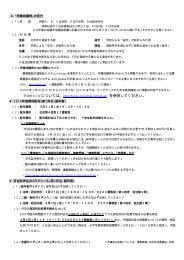
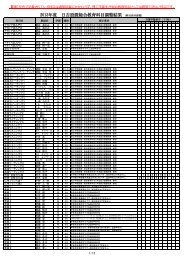
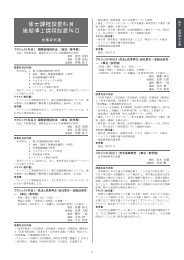
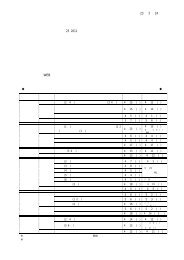
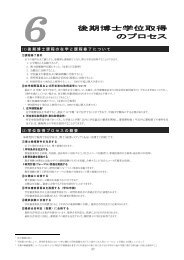
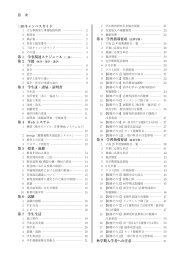



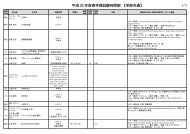

![文学部時間割表[2 ・3年生(07学則)]](https://img.yumpu.com/21046130/1/184x260/2-307.jpg?quality=85)

